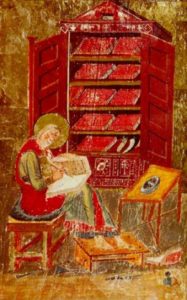 CASSIODORUS [c. 485-c. 580]: We have listened to a psalm [Psalm 68], wondrous in its heavenly arrangement, in which it is clear that the power in his [Jesus] divinity is matched by the humility in his humanity. The sacred Word took on the nature of our weakness—the psalm heading says that it is “for them that shall be changed”—so that he might free us from a truly deserved death by the death which was not his due. He entered the confines of hell so that the lower regions could be opened up. Death was conquered by the arrival of the Savior and rightly forfeited its enduring darkness once it received the eternal light. He conquered the devil by means of the human nature that Satan held subject; in his strength Satan was overcome by the weakness of the flesh, when God raised above all creatures endowed with reason that which was feebler than all the spiritual powers. As the apostle remarked, “To what angel has he ever said, ‘Sit at my right hand’?” No other nature has been made one with Christ except that of our flesh, which he took and which was glorified. Truly almighty, truly merciful is he who made blessed what was condemned, restored what was lost, freed what was subjugated, made our miseries strangers to us, and by his own death enabled man to live, when, though he was created immortal, the devil had caused him to die. Almighty God, we pray that, having deigned to suffer for us in the flesh, you may bestow on us the crown of which you deign us worthy. EXPOSITION OF THE PSALMS 68.17
CASSIODORUS [c. 485-c. 580]: We have listened to a psalm [Psalm 68], wondrous in its heavenly arrangement, in which it is clear that the power in his [Jesus] divinity is matched by the humility in his humanity. The sacred Word took on the nature of our weakness—the psalm heading says that it is “for them that shall be changed”—so that he might free us from a truly deserved death by the death which was not his due. He entered the confines of hell so that the lower regions could be opened up. Death was conquered by the arrival of the Savior and rightly forfeited its enduring darkness once it received the eternal light. He conquered the devil by means of the human nature that Satan held subject; in his strength Satan was overcome by the weakness of the flesh, when God raised above all creatures endowed with reason that which was feebler than all the spiritual powers. As the apostle remarked, “To what angel has he ever said, ‘Sit at my right hand’?” No other nature has been made one with Christ except that of our flesh, which he took and which was glorified. Truly almighty, truly merciful is he who made blessed what was condemned, restored what was lost, freed what was subjugated, made our miseries strangers to us, and by his own death enabled man to live, when, though he was created immortal, the devil had caused him to die. Almighty God, we pray that, having deigned to suffer for us in the flesh, you may bestow on us the crown of which you deign us worthy. EXPOSITION OF THE PSALMS 68.17
Ancient Christian Commentary on Scripture: New Testament X: Hebrews 28
